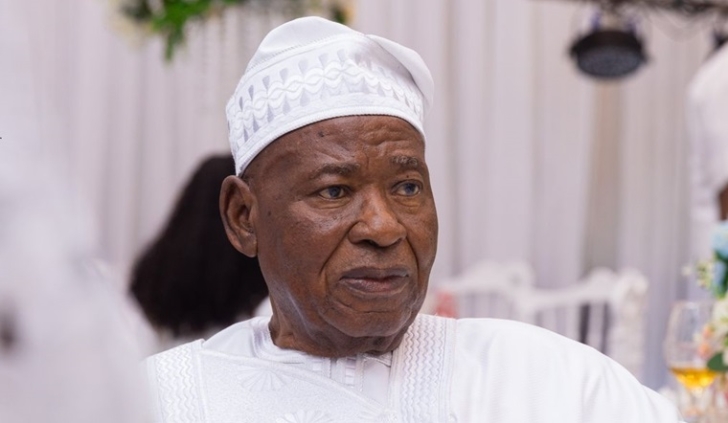
Ban surface mining - Statesman to govt
A statesman and retired accounting and business advisory expert has recommended a total ban on surface mining, including alluvial mining, in the country.
Ebenezer Magnus Boye, a consummate accountant and traditional ruler, stressed that the current surface mining regime, as pertained in the small-scale mining (SSM) sector, was largely accountable for the devastation of the environment and pollution of water bodies.
He described as hypocritical the situation where people cried foul over illegal mining, commonly called galamsey in local circles, but failed to emphasise that the small-scale mining sector contributed significantly to the pollution of water bodies and the destruction of large tracts of land.
“If you look at the current situation critically, you will realise that galamsey only causes about 10 per cent of the environmental damage; then we close our eyes and issue licences under the guise of SSM and do the same alluvial mining, and wash it into the same river. This must stop,” Mr Boye stressed.
In a recent interview, Mr Boye, who was the first Ghanaian to be admitted to partnership with an international accounting firm in Ghana, stressed that while the collective resolve by many groups to seek an end to illegal mining was commendable, the best approach was to stop surface mining and take a second look at the licensing regime for small-scale mining to strengthen regulation.
“All alluvial and surface mining should stop because it is not only spoiling our water bodies, it is also destroying our land,” Mr Boye, also known with the stool name Nana Okuambre Achiampong II, stressed.
His village in the Eastern Region is an isolated place among communities where galamsey does not thrive because he had sensitised his community members not to allow and indulge in the practice. He had also ensured that any company that showed up with a licence was denied entry to operate, especially if they did not have a reclamation bond.
Sanitise SSM
Mr Boye said what was being described as small-scale mining in the country was more harmful to the environment than galamsey, for which reason surface mining needed to be stopped in the national interest.
The former Country Partner of Coopers and Lybrand (now PricewaterHouseCoopers (pwc) stressed that not until a decisive action was taken to stop alluvial mining, the destruction of the environment would escalate.
“We must try and say that if we reserve our land for the next 100 or 200 years, we will get more benefit from it than today. There are a lot of countries which do not do alluvial mining, but their economies are going well,” he said.
Mr Boye added that if the galamsey menace was not tackled properly, its negative effects on the agricultural sector, including the cocoa sub-sector, and impact on economic growth would be devastating in the long run.
“If you go to the Western Region, there are people who are selling their cocoa land for concessions, and this is a serious threat to sustainable cocoa production in the country,” he said.
Cost-benefit analysis
The senior citizen emphasised that while there was the economic motivation to mine, it was also important to ponder over the opportunity cost of surface mining.
Mr Boye said especially when illegal mining was not only destroying the country’s vegetation but also contributing to the climate crisis, policies on mining must not be centred on the economic motive only.
“I hear people argue that Ghana cannot stop surface mining because the economy will suffer. They have failed to do total economic costing of this, because the money we get today is for this year's budget, but the future is under threat,” he said.
The statesman stated that although it may be difficult to take a bold decision to shift from surface mining because of the immediate economic benefits, it was sustainable to take that route because “we should not only get the money to live on while we live.”

Weak enforcement
Mr Boye further said SSM was being destructive because there was no thorough processes at the Minerals Commission on allocation of licences.
He added that small-scale surface and alluvial mining was so destructive that it was almost impossible to do any effective reclamation of the mined-out land.
He stressed that if drastic measures were not taken to stop the destruction of the environment through mining activities, future generations would not forgive the current generation for putting them in harm’s way.
Economy
Asked whether the country had done well since its independence, Mr Boye answered in the affirmative concerning physical and infrastructural progress, but was quick to ask: “At what cost have we done this?”
He said the cumulative depreciation in the value of the local currency as compared to its strength at independence indicated that managers of the economy were not doing things right.
“Now, the economy, the country has done well, but the cost at which it has done it is very, very, very disappointing,” he posited.
Mr Boye explained that at independence in 1957, a dollar was around 98 pesewas, saying if an American millionaire and his Ghanaian counterparts had both deposited the same amount of their local currencies in their respective banks, the American millionaire would be better off today, while the Ghanaian would be far worse off.
“If there was a millionaire at that time, Ghanaian millionaire, and he had one million and put in the bank and an American had $1 million and put in an American bank in 1957, today, the American millionaire goes to his bank and withdraws $1 million. If you have that in America now, you know it has value, isn't it?” he queried.
“The Ghanaian millionaire goes to his bank, locks it, and he's given GH¢1 million now. It's equivalent to GH¢100. He buys only 20 balls of kenkey,” Mr Boye analysed using an approach similar to the Big Mac index.
“You can see the extent to which we have developed ourselves. So if it had been all that so costly, what is the future going to be? Our credibility and other things are all down. So, we have to think and think well,” Mr Boye, who attained 90 in September this year, advised.
